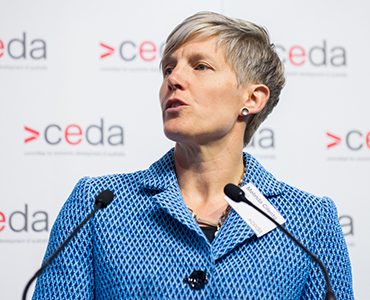As Australians are beginning to gain confidence in our response to the virus itself, public conversation is quickly and rightly swinging to economic recovery. As restrictions begin to be unwound we will watch carefully the impact this has on economic recovery.
 CEDA is using its network and experience during this period to explore new and innovative policy opportunities and options that go further than the usual tool kit of existing policy solutions.
CEDA is using its network and experience during this period to explore new and innovative policy opportunities and options that go further than the usual tool kit of existing policy solutions.
The usual – such as company tax cuts, reduced regulatory burden and IR reform – should all be on the table for debate. But we are going to need a broad economic agenda that incorporates innovative policy solutions to drive investment in these unusual times, if we are to drive the economic activity and job creation needed.
The CEDA team has been speaking with many members in the past few weeks and our content in the last week has explored issues such as what COVID-19 means for Australian productivity; building a fairer Australia after COVID-19; how COVID-19 is impacting digital inequality; and making good decisions during the current crisis.
This week we continue with a full program that is addressing the opportunities ahead.
Watch: We have two interactive livestreams. The first, Artificial Intelligence as a force for good, is on Tuesday 28 April. The current pandemic has shown first-hand how AI can positively impact healthcare delivery and policy. Join our panel as they discuss how AI can be a force for good.
Speakers include:
- Microsoft Australia, National Chief Technology Officer, Lee Hickin;
- Futureye, Managing Director, Katherine Teh
- Presagen, Co-Founder and CEO, Dr Michelle Perugini; and
- Swinburne University, Director for the Centre of New Workforce, Dr Sean Gallagher.
You can register
here.
On Thursday 30 April we will be discussing Regional economies’ resilience. Regional economies are diverse and robust, comprising 40 per cent of national economic output and employing one third of Australia’s workforce. Familiar with operating in uncertainty, regional Australia may be the key to providing a stabilising effect to our national economy.
Join our speakers on the day:
- Rural Economies Centre of Excellence, Director, Associate Professor Ben Lyons;
- Laguna Bay Pastoral Company, Chief Executive Officer, Tim McGavin; and
- Royal Flying Doctor Service, Chief Executive Officer (WA Operations), Rebecca Tomkinson
You can register
here.
Tickets for these online events are free to CEDA members, with low cost tickets available to non-members. You can also catch up with CEDA’s livestreams on demand on the
video archive page of the website.
Read: The CEDA blog continues to explore current issues and last week University of Sydney United States Studies Centre Trade and Investment Program Director, Dr Stephen Kirchner, wrote that the COVID-19 crisis emphasised the link between Australia's global integration and productivity growth. He argues that re-establishing Australia's international connectedness after the crisis should be a key priority for policymakers. You can read more
here.
Also on the blog, Logan Together Director, Matthew Cox; University of Queensland Institute for Social Science Research Professor, Tim Reddel; and public purpose strategy consultant Michael Hogan, write that the COVID-19 crisis offers an opportunity to 'build back better', creating a more equitable Australia by focusing on place-based solutions to societal disadvantage. Find out more
here.
In Public sector agility emerges in response to COVID-19, CEDA Associate Director NSW, David Bowtell, writes that COVID-19 has shown the public sector's ability to act effectively and quickly. He argues that capturing the lessons from this crisis will be critical for its success moving forward. You can read more on that
here.
Contribute: Economic performance, government efficiency, business efficiency and infrastructure – how do you think Australia is performing in these areas? As the exclusive Australian partner for the World Competitiveness Yearbook, CEDA encourages you to have your say and participate in the yearbook’s Executive Opinion Survey that closes this week.
To access the Executive Opinion Survey
click here. The World Competitiveness Yearbook is produced by the IMD World Competitiveness Centre and assesses the competitiveness of 63 countries based on more than 340 criteria, using official statistics and data from the Executive Opinion Survey results.
Completing the Executive Opinion Survey is your way to give feedback on Australia’s economic performance and your responses contribute to the Australian assessment and ranking in the yearbook which will obviously this year provide a very different outlook to years past.
IMD World Competitiveness Centre Director, Professor Arturo Bris visited in February and spoke at CEDA’s Economic and Political Overview events on the risks and opportunities for our country, view the footage from his presentation
here. Interestingly, Professor Bris spoke to the lack of economic dynamism in Australia and the impacts of that in terms of productivity and competitiveness. Issues very relevant to what Australia is facing right now.
CEDA will distribute the results of the survey in June when the 2020 yearbook is released.
Finally, I’d like to welcome our newest members:
- James Cook University (QLD)
- Sax Institute (NSW)
- Seqwater (QLD)
And thank our renewing members:
- Cardno (NAT)
- Google (NAT)
Thank you also to all our members and the wider CEDA community for your continuing support as we map the road out of the current crisis.
Until next week,
Melinda Cilento
